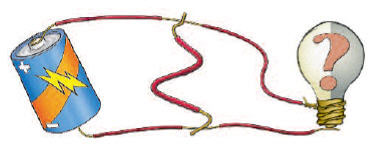Ben Franklin Was Lucky! Experiment Tips
This basic experiment appears in the section How Electricity Can Hurt You.
Materials
Students will need a circuit modified like the one shown in the illustration. (Strip a 1-inch section of insulation off the middle of each wire). Students will also need a 6-inch piece of thicker wire with 1 inch of insulation removed at each end.

Safety First
- Students should be supervised by an adult while doing this experiment.
- A teacher or another adult should be responsible for stripping insulation from wires.
- Remind students that they are able to work with these batteries and wires because the voltage is minimal (1.5 V per D-cell battery). They should never experiment with the electricity that comes from a wall outlet. It’s much more powerful than the electricity made by small batteries and could seriously injure or even kill someone.
Objective
Through creating a short circuit, students will understand that Ben Franklin got shocked because he touched two parts of a circuit at the same time.
Getting It Across
Have students read the information and follow the steps on the page. Be sure students understand that they should immediately disconnect the thick wire and the battery after they observe what happens. The wires will get hot. This is a clue to why Franklin got shocked.
Questions and Answers
Students’ predictions and results will vary.
Why is this called a “short circuit”? (Because the electricity travels a shorter route than the intended circuit. Electricity is not able to complete its intended path because the circuit is grounded somewhere.)
Why did Ben Franklin get shocked? (His arms functioned like the thick wire in the experiment. Electricity traveled through his body instead of through the circuit.)

